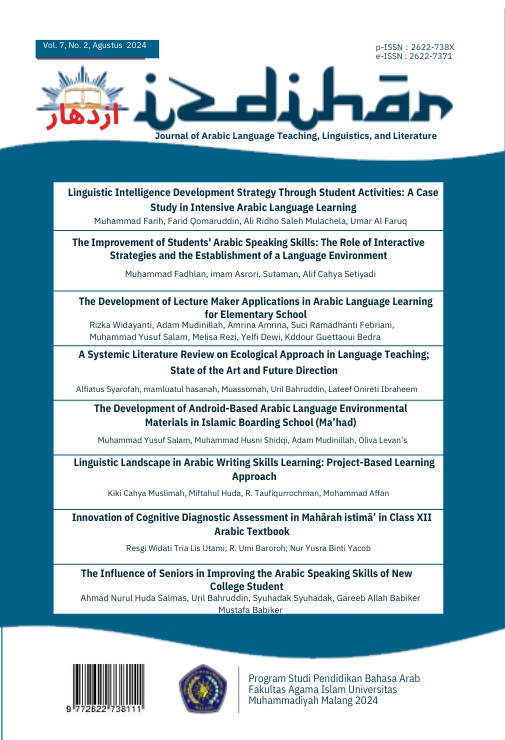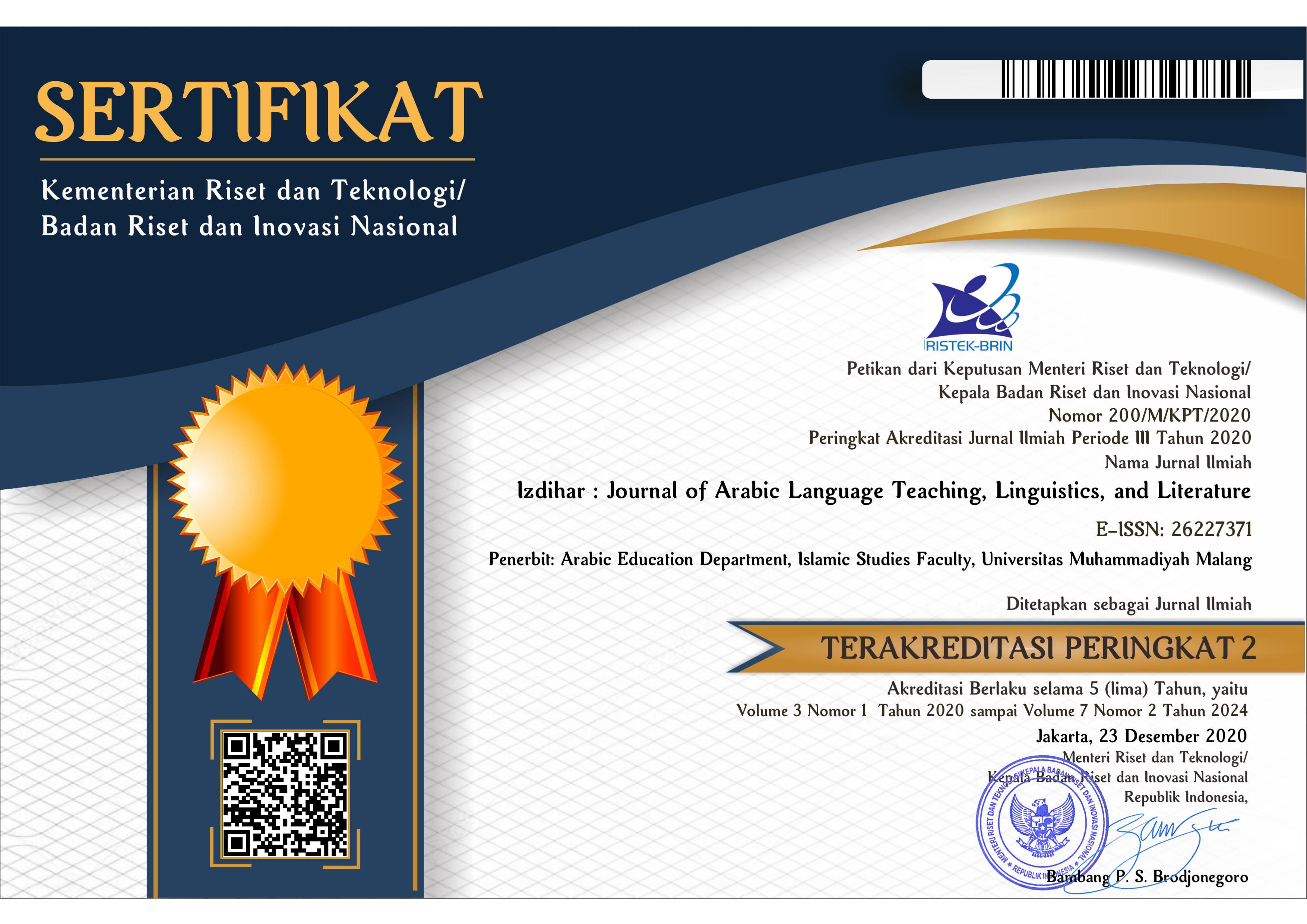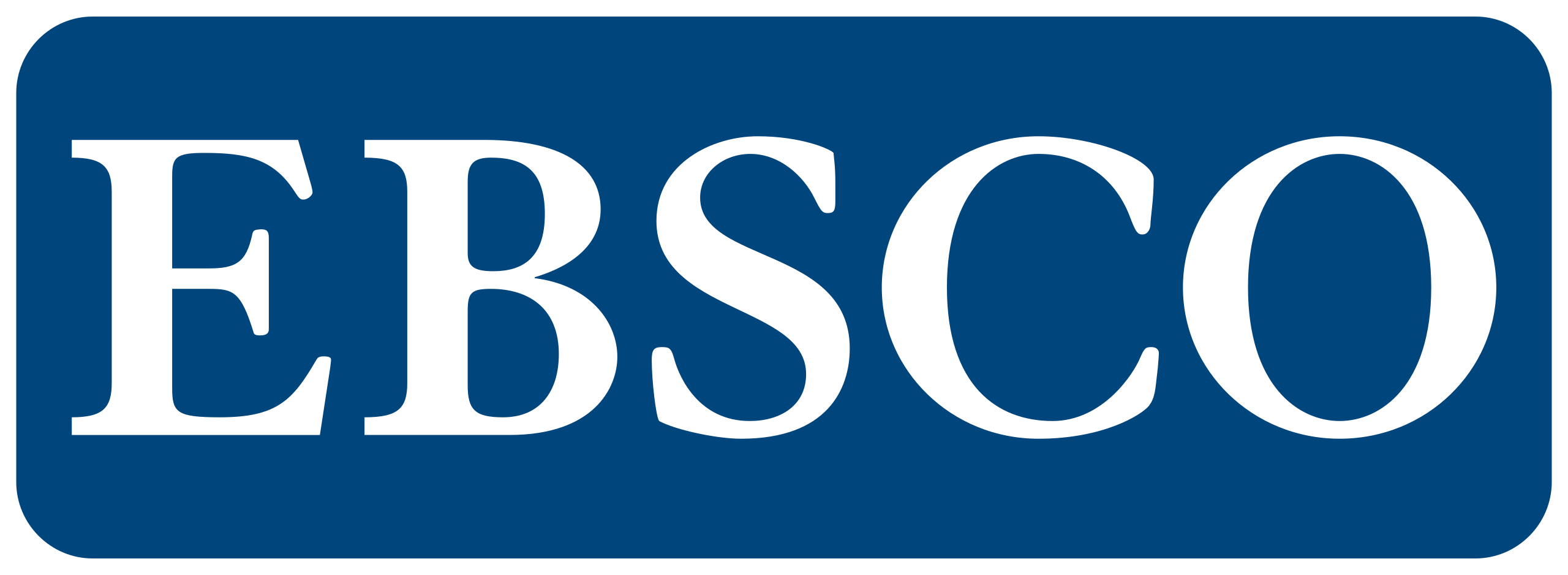The Development of Android-Based Arabic Language Environmental Materials in Islamic Boarding School (Ma’had)
DOI:
https://doi.org/10.22219/jiz.v7i2.29761Keywords:
Android Apps, Arabic, Language EnvironmentAbstract
The aim of this research was (1) to fulfill the need for Android-based Bi`ah Arabiyah material, (2) to ensure the suitability of Android-based Bi'ah Arabiyah material, and (3) to test the practicality of Android-based Bi'ah Arabiyah material. The research method used is 4D model R&D research through four stages, namely defining, designing, developing, and disseminating. The research that the researcher conducted only reached the 3 D stages, namely define, design, and develop. The results of this research are that the test subjects in this research were 12 first semester students using Aiken V with a minimum validity and practicality value of 71. Quantitative descriptive data analysis techniques are employed in qualitative data analysis methods. The results of the research show that material designed using Android can be used and applied in Ma'had 'Ali Syekh Sulaiman Araasuli Agam, West Sumatra, with language validation provisions with a score of 92.5, while for material validation with a score of 84.6 and for media validation with a score of 86.6, so that under these conditions the material designed is suitable for dissemination.
Downloads
References
Ahmad, A., & Nurhidaya, N. (2020). Media sosial dan tantangan masa depan generasi milenial. Avant Garde: Jurnal Ilmu Komunikasi, 8(2), 134–148. https://dx.doi.org/10.36080/ag.v8i2.1158
Arifai, A. (2018). Pengembangan kurikulum pesantren, madrasah dan sekolah. Raudhah Proud To Be Professionals: Jurnal Tarbiyah Islamiyah, 3(2), 13–20. https://doi.org/10.48094/raudhah.v3i2.27
Arikunto, S. (2021). Dasar-Dasar Evaluasi Pendidikan Edisi 3. Bumi Aksara.
Fatmawati, N. (2020). Gaya hidup mahasiswa akibat adanya online shop. Jurnal Pendidikan Ilmu Sosial, 29(1), 29–38. http://dx.doi.org/10.17509/jpis.v29i1.23722
Hariati, H. (2019). Analisis Perbandingan Sistem Pendidikan Pondok Pesantren Sumatera Thawalib Parabek Bukittinggi dengan Pondok Pesantren MTI Canduang Kab. Agam. AT-Tarbiyah: Jurnal Pendidikan Islam, 10(2), 43–56. https://doi.org/10.15548/attarbiyah.v10i2.1121
Jamun, Y. M. (2018). Dampak teknologi terhadap pendidikan. Jurnal Pendidikan dan Kebudayaan Missio, 10(1), 48–52. https://doi.org/10.36928/jpkm.v10i1.54
Maghfur, M. (2022). Teori Operant Conditioning dalam Pembelajaran Bahasa Inggris dan Bahasa Arab. Jurnal Ilmu Pendidikan Islam, 20(1), 139–158. https://doi.org/10.36835/jipi.v20i1.3938
Maritsa, A., Salsabila, U. H., Wafiq, M., Anindya, P. R., & Ma’shum, M. A. (2021). Pengaruh teknologi dalam dunia pendidikan. Al-Mutharahah: Jurnal Penelitian Dan Kajian Sosial Keagamaan, 18(2), 91–100. https://doi.org/10.46781/al-mutharahah.v18i2.303
Marpaung, J. (2018). Pengaruh penggunaan gadget dalam kehidupan. KOPASTA: Journal of the Counseling Guidance Study Program, 5(2). https://doi.org/10.33373/kop.v5i2.1521
Mukhlis, M. (2021). Teknologi Informasi Sebagai Media Inovasi Pendidikan.
Muslich, A. (2018). Nilai-nilai filosofis masyarakat jawa dalam konteks pendidikan karakter di era milenial. AL-ASASIYYA: Journal Of Basic Education, 2(2). http://dx.doi.org/10.24269/ajbe.v2i2.1119
Mustofa, I. (2020). FORMULASI PENDIDIKAN PESANTREN DALAM UU NOMOR 18 TAHUN 2019 TENTANG PESANTREN:(TINJAUAN KEBIJAKAN PENDIDIKAN). Intizam: Jurnal Manajemen Pendidikan Islam, 4(1), 20–35. https://ejournal.staidapondokkrempyang.ac.id/index.php/intizam/article/view/48
Permatasari, A. (2015). Membangun kualitas bangsa dengan budaya literasi. 148.
Pratiwi, I. T. M., & Meilani, R. I. (2018). Peran Media Pembelajaran Dalam Meningkatkan Prestasi Belajar Siswa. Jurnal Pendidikan Manajemen Perkantoran, 3(2), 33. https://doi.org/10.17509/jpm.v3i2.11762
Pujianto, A. A., Degeng, I. N. S., & Sugito, S. (2020). Pengaruh penggunaan aplikasi Plantnet dan gaya belajar terhadap hasil belajar. Jurnal Inovasi Teknologi Pendidikan, 7(1), 12–22. https://doi.org/10.21831/jitp.v7i1.31365
Rachman, B. M. (2010). Sekularisme, liberalisme, dan pluralisme. Grasindo.
Rahutami, A. I., & Suwarno, D. (t.t.). Perspektif-Social and Technological Outlooks on Life" Sebuah Asa Generasi Untuk Generasi". Perzpektif-Social and Technological Outlooks on Life. https://repository.unika.ac.id/id/eprint/17593
Rohanda, R. (t.t.). Kurikulum KKNI Bahasa dan Sastra Arab.
Rosa, F. O. (2015). Pengembangan modul pembelajaran IPA SMP pada materi tekanan berbasis keterampilan proses sains. Jurnal Pendidikan Fisika, 3(1). http://dx.doi.org/10.24127/jpf.v3i1.21
Siti, N. (2021). Implikasi Berlakunya Undang-Undang Nomor 18 Tahun 2019 Tentang Pesantren terhadap Administrasi Pondok Pesantren di Banyumas (Studi Kasus Pondok Pesantren di Kecamatan Kemranjen Kabupaten Banyumas).
Sugiyono, D. (2013). Metode penelitian pendidikan pendekatan kuantitatif, kualitatif dan R&D.
Sujati, B. (2018). Sejarah Perkembangan Globalisasi dalam Dunia Islam. NALAR: Jurnal Peradaban dan Pemikiran Islam, 2(2), 98–109. https://doi.org/10.23971/njppi.v2i2.969
Suryanda, A., Azrai, E. P., & Julita, A. (2019). Validasi Ahli pada Pengembangan Buku Saku Biologi Berbasis Mind Map (BIOMAP): Expert Validation on The Development Biology Pocketbook Based on Mind Map (BIOMAP). BIODIK, 5(3), 197–214. https://doi.org/10.22437/bio.v5i3.6879
Susanti, F., & Gunawan, A. C. (2019). Pengaruh bauran promosi dan harga terhadap keputusan pembelian produk kosmetik Maybelline di kota Padang.
Syabibi, M. R. (2020). “Diskursus Pribumisasi Islam Di Ruang Publik: Dakwah Abdurrahman Wahid Perspektif Tindakan Komunikatif Jurgen Habermas. Sekolah Pascasarjana UIN Syarif Hidayatullah Jakarta. https://repository.uinjkt.ac.id/dspace/handle/123456789/54111
Triputro, R. W. (2022). Fasilitas pesantren di Kabupaten Magelang. The Journal Publishing, 3(3), 1–98. https://thejournalish.com/ojs/index.php/books/article/view/232
Wijaya, W. (2020). Pembinaan Budi Pekerti melalui Spiritualitas Jawa.
Yusmei, N. (2022). Kontribusi Ma’had Aly terhadap Pemahaman Keislaman Melalui Pendidikan Agama Islam di Indonesia. Jurnal Penelitian Ilmu Pendidikan Indonesia, 1(2), 117–126. https://doi.org/10.31004/jpion.v1i2.27
Zis, S. F., Effendi, N., & Roem, E. R. (2021). Perubahan perilaku komunikasi generasi milenial dan generasi z di era digital. Satwika: Kajian Ilmu Budaya Dan Perubahan Sosial, 5(1), 69–87. https://doi.org/10.22219/satwika.v5i1.15550
Zubaidah, S. (2010). Lesson Study sebagai salah satu model pengembangan profesionalisme guru. Jurnal Inspirasi Pendidikan, 2(1), 1–14. https://www.researchgate.net/publication/318040478_LESSON_STUDY_SEBAGAI_SALAH_SATU_MODEL_PENGEMBANGAN_PROFESIONALISME_GURU_1
Downloads
Published
How to Cite
Issue
Section
License
Copyright (c) 2024 Muhammad Yusuf Salam, Muhammad Husni Shidqi, Adam Mudinillah, Oliva Levan’s

This work is licensed under a Creative Commons Attribution-ShareAlike 4.0 International License.
Copyright Notice
Authors who publish with this journal agree to the following terms:
- Authors retain copyright and grant the journal right of first publication with the work simultaneously licensed under a Creative Commons Attribution-ShareAlike 4.0 International License that allows others to share the work with an acknowledgment of the work's authorship and initial publication in this journal.
- Authors are able to enter into separate, additional contractual arrangements for the non-exclusive distribution of the journal's published version of the work (e.g., post it to an institutional repository or publish it in a book), with an acknowledgment of its initial publication in this journal.
- Authors are permitted and encouraged to post their work online (e.g., in institutional repositories or on their website) prior to and during the submission process, as it can lead to productive exchanges, as well as earlier and greater citation of published work (See The Effect of Open Access).
Copyright (c) 2019 Izdihar : Journal of Arabic Language Teaching, Linguistics, and Literature

This work is licensed under a Creative Commons Attribution-ShareAlike 4.0 International License.


















